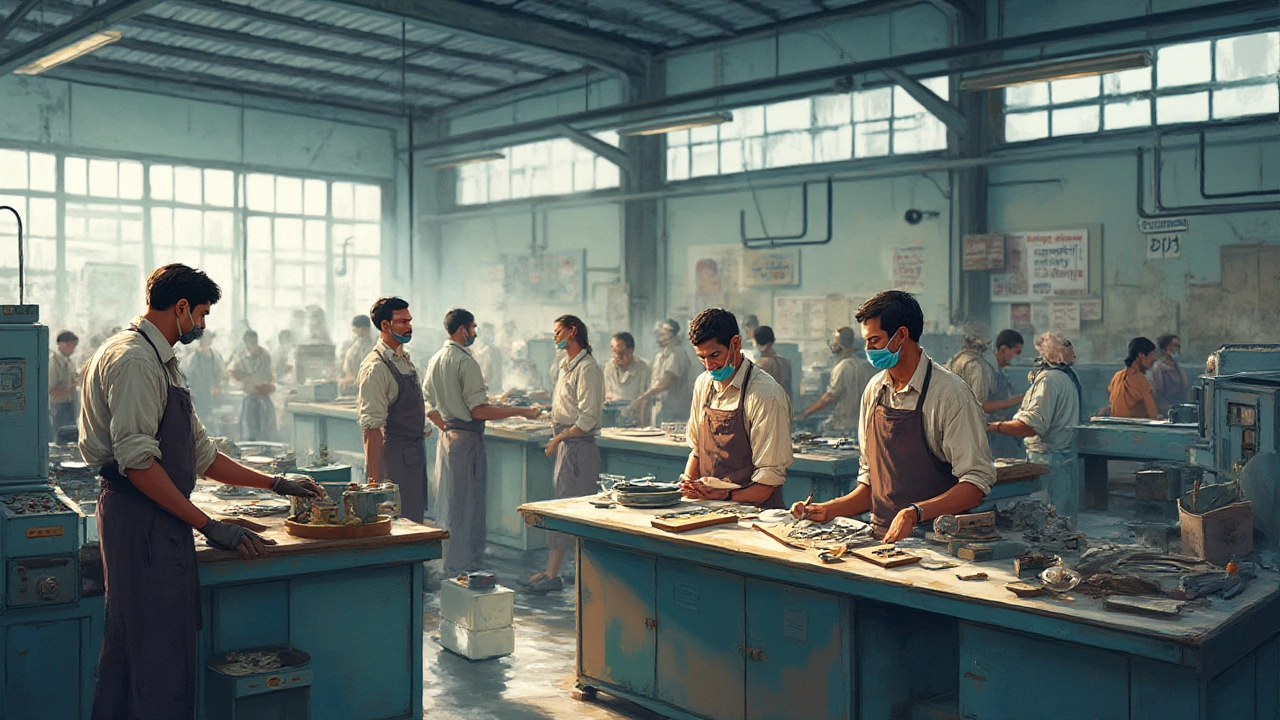Ever wonder why some manufacturing companies have hallways buzzing with activity while others barely scrape by? It’s not just about having machines humming away or products rolling out the door. What makes a manufacturing company good goes way beyond shiny factories or patented tech—not that those things hurt. Yet, dig deeper, and it’s about reputation for reliability, constant push for better quality, and a knack for adapting before the market even realizes it wants something new. A good manufacturer can make or break every single thing we take for granted—your smartphone, your food packaging, even your toothbrush. Now, if you think there’s some kind of magic recipe they all follow, here’s where the real story gets interesting.
What Sets Good Manufacturing Companies Apart
Start with the basics: a company’s quality game. The manufacturers that rise to the top obsess over getting it right every single time. It’s not luck when you buy a major appliance and it hums along, problem-free, for years. Take Toyota: they've perfected what they call the Toyota Production System, a method laser-focused on reducing waste while improving productivity and quality. That’s why you rarely hear about a Toyota breaking down in its first decade. It boils down to their relentless commitment to lean manufacturing—every step, every part, every person has a clear purpose.
But 'good' isn't just about pumping out products. It's about consistency and trust. Look at companies like Procter & Gamble or Unilever. Their consumer goods hit shelves in 190 countries, and you’d be hard-pressed to find a dud batch. Why? Quality control isn't just a department for them—it's part of the company DNA. In 2024, according to a study by the Manufacturing Leadership Council, 89% of top-performing factories worldwide reported making data-driven decisions based on real-time feedback from their production lines. If a batch of something isn’t up to scratch, it’s not just quietly dumped; it’s flagged, analyzed, and fixed before it becomes a customer headache. If only finding matching socks were that reliable.
Another essential factor is workforce investment. Good manufacturing companies treat their people like assets, not just a means to an end. You walk into a BMW or Siemens plant, and you’re likely to run into workers who’ve been around for decades, training newbies and driving innovations. They don't just go through the motions; they contribute ideas that actually get implemented. That’s one reason manufacturing wages in Germany remain higher than the global average—experience and skill are rewarded, not squeezed. And smart companies know automation isn’t about cutting jobs; it’s about getting rid of boring, repetitive work so their people can focus on solving real problems.
Don’t forget adaptability. Companies that survived the chip shortages, the pandemic closures, and the global shipping snarl-ups? They’re the ones who didn’t freeze. Foxconn, famously the assembler for Apple’s iPhone, reacted to COVID-19 disruptions by shifting their supply chains and repurposing lines to build medical equipment in a matter of weeks. That’s not just hustle—it’s a built-in culture of flexibility. The best in the field are proactive, not reactive. If you’re scouting for a manufacturer, ask how they handled recent crises—not just what they do when things are smooth sailing.
Then there’s the supply chain game. Good manufacturers don’t just keep eyes on their factories; they know where their raw materials come from, they know their suppliers’ weaknesses. Jeff Bezos once quipped that Amazon’s operational edge wasn’t just software magic—it was the obsession over logistics and supply chain reliability. Top manufacturers know bottlenecks in parts supply can bring even the most sophisticated assembly lines to a halt.
And let's talk certifications. Getting (and keeping) internationally recognized standards like ISO 9001 isn’t a one-off trophy; it’s a promise to stay on top of documentation, training, and continual process improvement. Companies like Johnson & Johnson are sticklers for these standards—there's a reason hospitals worldwide trust their products. But if you ever visit a factory and they act sketchy about certification paperwork, your warning bells should be blaring.

Spotting the Best: Real-World Examples and Red Flags
Ever tried sourcing a manufacturer and ended up lost in a sea of glossy brochures all claiming to be “the best”? The real test comes in their track record, transparency, and tech know-how. Take Samsung, for instance—they churn out not just phones but crucial components for half the smartphone brands you’ve heard of, all by sticking to rigorous self-imposed standards. In 2023, Samsung’s semiconductor division invested more than $12 billion upgrading existing lines and training employees, not just adding robots for the sake of press releases.
If you want a lesson in transparency, just look at Patagonia’s approach in textiles. They publish details of their factories for customers to see—locations, working conditions, even photos. This isn’t just feel-good storytelling; it’s proof they’re walking the walk on ethical sourcing and worker welfare. In contrast, when large brands go silent about supplier audits or brush off questions about sourcing, that’s your red flag. The Rana Plaza disaster in Bangladesh back in 2013 was traced directly to neglect in oversight and accountability. The best companies don't just patch up after scandals; they overhaul their whole approach so it never happens again.
Aim for transparency in pricing, too. Good manufacturers—like those in Germany’s precision tool sector or Japan’s automotive parts makers—offer quotes that spell out costs, lead times, and contingencies if things go sideways. If you run a small business and a manufacturer dishes out a suspiciously low price or vague timeline, proceed with caution. There’s probably a reason they can’t give you straight answers—either they’re cutting corners or prepping to hit you with surprise fees later on.
On the tech front, good companies invest heavily in upgrades. It’s not about chasing trends but using tech that makes processes smoother and smarter. In 2024, Tesla’s Gigafactories doubled down on AI-driven robotics, with algorithms constantly tweaking assembly flows to spot quality slips before they become costly mistakes. Back in the day, you might have worried about a bolt left loose by a tired worker—now, smart sensors don’t let a car roll out unless every piece is exactly as it should be. Yet, you can spot a laggard from a mile away: outdated equipment, safety corners cut, and zero digital traceability for parts. These are all dealbreakers now, not minor flaws.
Want to really separate the top dogs from the rest? Check what their partners say. It’s not all about splashy awards—supply chain partners, major buyers, and even employees talk. Visit Glassdoor, scan trade magazines, or ask for case studies. A good manufacturer is usually anxious to brag about helping clients solve tough challenges. If all you hear is dodges or canned testimonials, trust your gut—move on.
Let’s not ignore environmental impact. The days when factories could pump smog and dump sludge without a care are, thankfully, over. Sweden’s IKEA is a textbook case: they’re pushing hard toward closed-loop manufacturing, recycling leftover wood and plastics into new furniture. American food giant General Mills recently committed to cutting greenhouse gases across its supply chain by 30% before 2030, and their progress reports are public. Any company that refuses to share its environmental policies or data, especially in 2025, probably has something to hide.

Tips and Strategies for Picking a Good Manufacturing Company
If you’re on the hunt for a manufacturing partner—whether you’re planning to launch a kitchen gadget or scale up your supplement brand—it pays to be picky. First, do your homework. Don’t just scroll their website; read up on their major clients, check public records, and request references. Ask for factory tour videos or, if possible, visit in person. You'd be amazed how much you pick up from a walk through the floor—the sounds, the organization, even how workers interact with supervisors. Red flags stick out in person: outdated safety gear, unfinished products piling up, workers obviously checked out, or staff who hesitate to answer basic questions.
Your contract matters—spell out quality standards, inspection rights, and penalties for missed deadlines. In 2024, a surprising number of lawsuits (24% more than three years prior, says the International Manufacturing Law Yearbook) cropped up simply because buyers and manufacturers didn't put expectations in black and white. Don't assume a handshake and email chain is enough; your kid Quentin’s handshake is probably more binding than a vague, unsigned contract.
Be crystal clear about communication. Set up regular check-ins—even if it’s just a short video call every couple of weeks. If your manufacturer welcomes these with updates, photos, and status reports, that’s a promising sign. If they dodge or only surface when there’s a problem, that’s your cue to bail.
If certifications matter in your industry—think food safety, pharmaceuticals, or electronics—insist on proof. And don’t just settle for a certificate scan; check dates, issuing agencies, and if they’re still valid. One of the big pharmaceutical recalls in 2023 was traced back to a supplier who forged a certificate—the cost in reputation and lost sales? Astronomical.
Finally, value the soft stuff. How do they handle hiccups? If supply chain troubles hit, do they inform you and suggest fixes, or do you find out weeks late when stock doesn’t show? Good manufacturers are more like business partners than order fillers. Ask hypothetical scenario questions: “What’s your process if an order doesn’t meet my specs? How fast can you pivot if I double my order?” If they walk you through past examples and stay realistic rather than promising the moon, you’ve likely found a keeper.
For start-ups and small businesses with tight budgets, don’t assume the biggest company is best—or that a family-run operation can’t deliver. Instead, focus on track record, transparency, and responsiveness. Sometimes, a nimble small operation can give you more innovation and attention than a giant with thousands of clients. On the other hand, if you need massive capacity or strict compliance, major established players might be worth the extra cost and red tape.
Nobody said picking a great manufacturer is easy, but it’s doable. The more you dig, ask, and pay attention—not just to what they promise but to how they work—the better your odds. And once you nail down a good partner, everything else in your business just gets easier. Sounds simple, but ask anyone who’s been burned: finding a good manufacturing company is usually the difference between business dreams and nightmares.






